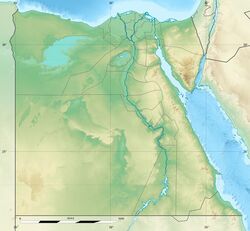Religion:Serapion of Nitria
Serapion of Nitria or Serapion of Thmuis (Greek: Σεραπίων, romanized: Serapíon; Russian: Серапион) was an early Christian monk in Nitria, Lower Egypt, born in the third century AD. He was a companion of Anthony the Great, the abbot of the Monastery of Arsina in Nitria, and the bishop of Thmuis. His feast day in March 21 in the Orthodox Church.[1]
Life
Little is known about Serapion. He is quoted in four sections of the Sayings of the Desert Fathers, where he is called Abba Serapion,[2] and is commemorated on March 21 in the Prologue of Ohrid, an Orthodox synaxarium written by Saint Nikolaj Velimirović.[1]
Serapion (a variant of the name Seraphim derived from Seraph) was the abbot of the Monastery of Arsina (Latin: Arseonita), which at one point held as many as eleven-thousand monks.[1] He was given the title "the Great" by the early Christian historians Sozomen and Palladius.
Serapion died c. 358.[1]
Story
A famous story of Serapion is recounted in the Sayings of the Desert Fathers. He is said of have paid a prostitute under the pretense of seeking sexual favors. But instead of engaging with her, he prayed for a long time in front of her and eventually converted her to Christianity. She later became a nun at a monastery and practiced extreme ascetic labors.[2]
The same story also exists in a poetic Hymn of Praise in the Prologue of Ohrid.[1]
Notable works
- The Life of Anthony (not to be confused with the Life of Anthony by Athanasius)
- Sacramentary of Serapion of Thmuis
Quotes
From the Prologue of Ohrid:
- "Do not think that sickness is difficult; only sin is difficult. Sickness follows the sinners only in life, but sin follows the sinner into the grave."
From the Sayings of the Desert Fathers:
- "When the soldiers of the emperor are standing at attention, they cannot look to the right or left; it is the same for the man who stands before God and looks towards Him in fear at all time; he cannot then fear anything from the enemy."
References
- ↑ 1.0 1.1 1.2 1.3 1.4 Velimirović, Nikolaj. The Prologue of Ohrid: Lives of Saints, Hymns, Reflections and Homilies for Every Day of the Year. OCLC 944525984. http://worldcat.org/oclc/944525984.
- ↑ 2.0 2.1 Ward, Benedicta (1980). The Desert Christian: Sayings of the Desert Fathers: the Alphabetical Collection. Macmillan. OCLC 1244597558. http://worldcat.org/oclc/1244597558.


